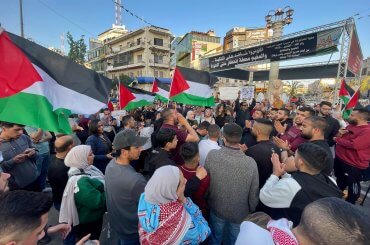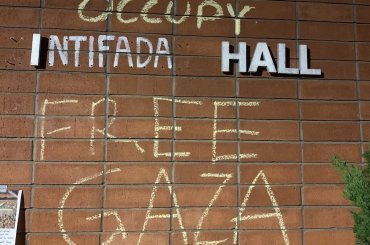Palestinian refugees from the refugee camps of Lebanon met with members of the Ramapough Lenape tribe on Friday, September 15 for a communal dialogue about joint indigenous struggle, tactics, and future collaboration. The stop was at the inaugural event of the 2017 North America Nakba Tour, which brings Palestinian refugees Khawla Hammad and Amena El-Ashkar to visit communities in North America.
Khawla is a survivor of the Nakba, where Israel expelled around 800,000 Palestinians in 1948 during the creation of the state. Khawla ended up in a refugee camp in Lebanon.
Amena and Khawla traveled to New Jersey where they were hosted by the Ramapough Lenape tribe at Split Rock Sweetwater Prayer Camp, property the tribe privately owns. There, the two women met with Palestinian-Americans, organizers with the Nakba tour and members of the Ramapough Lenape–Aaron, Two Clouds, and Chief Dwaine Perry.
Although the Lenape nation is indigenous to present-day New Jersey and much of the area of the prayer camp has belonged to the tribe historically, forced displacement by American colonization has resulted in Lenape living throughout North America. The Lenape nation is part of a coalition that seeks to halt the construction of an oil pipeline that is being built through their historic lands, including the oldest Native burial ground in North America that is located several miles from the prayer camp.

Tribe members like Chief Dwaine Perry report that since the tribe began receiving greater and more visible support in its campaigns against the pipeline following the Standing Rock demonstrations, the nearby town of Mahwah, collaborating with local property owners, has become increasingly aggressive in trying to confiscate the Prayer Camp land. The town has used manipulative rezoning tactics and regulatory fines as well as an elaborate police frame-up against the Chief and several other Lenape. This repressive action has diverted much of the Tribe’s focus on stopping the pipeline and is part of a long and sordid history of corporate abuse against the Lenape tribe.
During the communal dialogue, members of the tribe remarked about the similarities and differences of the struggles that the Lenape face locally compared to the struggle of the Palestinians who were displaced.
Speaking through Amena’s translation, Khawla remarked that she and the Lenape “share the same struggle. We’ve been moved from land to land, just like you. And we share the same agony.” She echoed Chief Perry’s comment that oftentimes, clear solutions to the predicament that indigenous people are in can seem elusive. Khawla went on to share her personal story of expulsion, discussing how her father was killed fighting against British occupying forces in Palestine in 1938. She discussed the close relations that she and other villagers had with Jews in Palestine until the Nakba.
Aaron, another member of the tribe, said he has followed the Palestinian struggle since the 1980s: “As indigenous people to this country, I know your struggle is fashioned after what they did to us. So it is very important to study what happened to us; they will do it to you.” Khawla responded that part of the way Palestinians had sought to preserve historical memory was by ensuring that each generation of Palestinians teaches the next, “so we don’t forget about Palestine.”
Although they were quick to emphasize that the situation cannot be compared to military occupation, tribe members pointed to the use of borders and space restrictions as a crucial similarity. Shirley, a local who had participated in a delegation to Palestine, recalled her trip through Qalandia, an Israeli military checkpoint in the occupied West Bank, and the way in which restrictions for Palestinians are unbearable, even though Israeli Jews appeared to be oblivious to the difficulties. Tribe members noted that similarly, local property owners had gradually used zoning restrictions to push out the Lenape, while nonetheless creating an air of normalcy as the land was slowly swallowed up.
Much of the discussion focused on Israel’s exploitative use of “anti-Semitism” allegations to shield Israel from criticism. Two Clouds emphasized that Israel was using Judaism the way American settlers had weaponized Christian identity in the displacement of the Lenape.
Chief Perry emphasized the importance of “unmasking” the institutions responsible for colonization, emphasizing that rather than pursuing an “us versus them” mentality, it is more strategic to figure out the individuals who are personally benefiting from the subjugation of Palestine, just as there are individuals who are profiting from the repression against the tribe. Aaron emphasized that it was nonetheless important not to lose sight of the structural nature of the oppression taking place in Palestine.
One point of discussion was the attempt by Israel to erase Palestine’s indigenous history, rendering Palestine a “land without a people”. Chief Perry mentioned that the Lenape’s indigeneity was also being challenged by opponents of the Prayer Camp. Indeed, the Lenape were subject to similar attacks by now-President Donald Trump during his 1993 bid to prevent federal recognition of the tribe, which would then be able to compete with his nearby casino business. President Trump told a radio host in 1993, “I think I might have more Indian blood than a lot of the so-called Indians that are trying to open up the reservations.” Today, the tribe does not have federal recognition and the land they own does not have tribal sovereignty.


In discussing the role that religion has played in the conflict, Amena and Khawla emphasized that the conflict was about land, and not religion. After the meeting, Amena and several others stayed at the camp to dine with Two Clouds, who personally prepared a meal that he fished, hunted, and cooked for the guests. Two Clouds discussed the religious beliefs of the Lenape that were embodied in some of the ceremonial structures on the Prayer Camp. Though Amena had seen Palestinian and Native American struggles analogized before, she was intrigued to learn that many Lenape, including Two Clouds, are practicing Muslims. Two Clouds is a third-generation Muslim.
Though the meeting was brief, tour organizers and members of the tribe hope that the Nakba Tour will provide avenues to build a common political coalition between Palestinian refugees and indigenous communities in North America. The North America Nakba Tour will continue traveling throughout the East Coast this fall, with events happening through December.



Amith,
Thanks very much for sharing this article! I learned a new few things about this particular group of Native Americans.
High time. It’s not so long ago that Native leaders in Canada were under the impression that the Jewish immigrants were the “natives” in Israel.